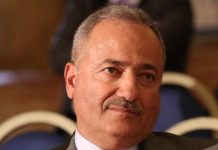Hezbollah coerces refugee return/مكرم رباح: حزب الله يُكرِّه (يجبر) اللاجئين السوريين على العودة
Makram Rabah/Al Arabiya/July 10/18
The Lebanese have always prided themselves on their resilience and their ability to turn adversity into opportunity, or at least this is what the Lebanese myth propagates.
The reality of the matter is somewhat different, as the Lebanese and their political elite have repeatedly failed to rise to the occasion and institute a sovereign and viable nation state.
Over time, the Lebanese state has relinquished many of its prerogatives to the ruling elite, who in turn operate a highly developed clientalist system that uses the state’s resources to strengthen its own powerbase.
Additionally, the Lebanese have relinquished its sovereignty on one of the most important prerequisite of statehood, by allowing Hezbollah to operate its militia unchecked both within Lebanon and across the region.
Recently, the Lebanese state have went a step further in its downwards descend by allowing Hezbollah to publically declare that it will be implementing a plan to ensure or perhaps “force” the return of the 1.2 million Syrian refugees in Lebanon.
Ironically, Hezbollah and fellow Iranian militias are mainly responsible for destroying and later occupying many of these Syrian refugees’ villages and towns.
Both Aoun and Hezbollah wish to use the refugees to serve a number of goals, which primarily include demonizing refugees and the international community, and blame them for Lebanon’s collapsing economy
Facilitating role
In his recent address, Hassan Nasrallah, Secretary General of Hezbollah, declared that his own party would play a facilitating role in the return of the Syrian refugees, a task that in his own mind is made possible due to his party’s excellent relationship with the Assad regime.
Audaciously, Nasrallah further declared that formation of a Hezbollah refugee affairs committee that would submit lists of names to the Syrian government for approval after which these refugees can return home.
The obvious infringement on Lebanon sovereignty exceeds the fact that Nasrallah trusts he can replace the Lebanese state as well as the international community in the refugees crisis, but he also believes that their safe return is isolated from any political settlement of the Syrian crisis.
Nasrallah’s proposed return-mechanism is outright unsound as the mere screening of refugees by the Assad regime means that the reason for their displacement is still present and the chances of persecution as well.
If Nasrallah truly wants to expedite the return of the refugees in a manner that conforms to international humanitarian standards, he can start by ordering his fighters to evacuate the Qalamoun region across Lebanon’s eastern border, a move that would allow for the immediate return of thousands of refugees.
More importantly, from a policy perspective Hezbollah has allowed its main ally, President Aoun and his son-in-law Gebran Bassil to antagonize and bully the international community and the United Nations High Commissioner for Refugees-UNHCR and accuse them of conspiring against Lebanon and plotting to naturalize these refugees.
A viable plan
It would be wiser for the Lebanese state and even Hezbollah to put forth a viable plan for the gradual return of these Syrian refugees one that would allow Lebanon to honor its commitment to maintain disassociation from the regional conflict and avoid further alienating itself from the Arab world.
Both Aoun and Hezbollah wish to use the refugees to serve a number of goals, which primarily include demonizing the refugees and the international community, and blame them for Lebanon’s collapsing economy. From their end both Aoun and Bassil, wish to divert Lebanese public attention from the series of corruption scandals and abysmal governance policies, which their term in office has so far yielded.
*Makram Rabah is a lecturer at the American University of Beirut, Department of History. He is the author of A Campus at War: Student Politics at the American University of Beirut, 1967-1975. He tweets @makramrabah.
Disclaimer: Views expressed by writers in this section are their own and do not necessarily reflect the “LCC”‘ point-of-view






















